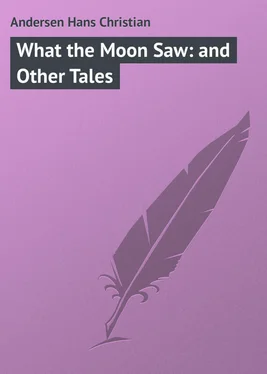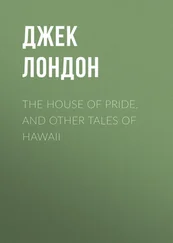Andersen Hans - What the Moon Saw - and Other Tales
Здесь есть возможность читать онлайн «Andersen Hans - What the Moon Saw - and Other Tales» — ознакомительный отрывок электронной книги совершенно бесплатно, а после прочтения отрывка купить полную версию. В некоторых случаях можно слушать аудио, скачать через торрент в формате fb2 и присутствует краткое содержание. Жанр: foreign_prose, на английском языке. Описание произведения, (предисловие) а так же отзывы посетителей доступны на портале библиотеки ЛибКат.
- Название:What the Moon Saw: and Other Tales
- Автор:
- Жанр:
- Год:неизвестен
- ISBN:нет данных
- Рейтинг книги:5 / 5. Голосов: 1
-
Избранное:Добавить в избранное
- Отзывы:
-
Ваша оценка:
- 100
- 1
- 2
- 3
- 4
- 5
What the Moon Saw: and Other Tales: краткое содержание, описание и аннотация
Предлагаем к чтению аннотацию, описание, краткое содержание или предисловие (зависит от того, что написал сам автор книги «What the Moon Saw: and Other Tales»). Если вы не нашли необходимую информацию о книге — напишите в комментариях, мы постараемся отыскать её.
What the Moon Saw: and Other Tales — читать онлайн ознакомительный отрывок
Ниже представлен текст книги, разбитый по страницам. Система сохранения места последней прочитанной страницы, позволяет с удобством читать онлайн бесплатно книгу «What the Moon Saw: and Other Tales», без необходимости каждый раз заново искать на чём Вы остановились. Поставьте закладку, и сможете в любой момент перейти на страницу, на которой закончили чтение.
Интервал:
Закладка:
In the meantime a messenger from the mayor's house had been dispatched to her poor lodging to tell her "to come to the mayor immediately, for he had something to tell her." It was too late! A barber-surgeon was brought to open a vein in her arm; but the poor woman was dead.
"She has drunk herself to death!" said the mayor.
In the letter that brought the news of his brother's death, the contents of the will had been mentioned, and it was a legacy of six hundred dollars to the glovemaker's widow, who had once been his mother's maid. The money was to be paid, according to the mayor's discretion, in larger or smaller sums, to her or to her child.
"There was some fuss between my brother and her," said the mayor. "It's a good thing that she is dead; for now the boy will have the whole, and I will get him into a house among respectable people. He may turn out a reputable working man."
And Heaven gave its blessing to these words.
So the mayor sent for the boy, promised to take care of him, and added that it was a good thing the lad's mother was dead, inasmuch as she had been good for nothing.
They bore her to the churchyard, to the cemetery of the poor, and Martha strewed sand upon her grave, and planted a rose tree upon it, and the boy stood beside her.
"My dear mother!" he cried, as the tears fell fast. "Is it true what they said: that she was good for nothing?" "No, she was good for much!" replied the old servant, and she looked up indignantly. "I knew it many a year ago, and more than all since last night. I tell you she was worth much, and the Lord in heaven knows it is true, let the world say as much as it chooses, 'She was good for nothing.'"
"THERE IS A DIFFERENCE."
It was in the month of May. The wind still blew cold, but bushes and trees, field and meadow, all alike said the spring had come. There was store of flowers even in the wild hedges; and there spring carried on his affairs, and preached from a little apple tree, where one branch hung fresh and blooming, covered with delicate pink blossoms that were just ready to open. The apple tree branch knew well enough how beautiful he was, for the knowledge is inherent in the leaf as well as in the blood; and consequently the branch was not surprised when a nobleman's carriage stopped opposite to him on the road, and the young countess said that an apple branch was the loveliest thing one could behold, a very emblem of spring in its most charming form. And the branch was most carefully broken off, and she held it in her delicate hand, and sheltered it with her silk parasol. Then they drove to the castle, where there were lofty halls and splendid apartments. Pure white curtains fluttered round the open windows, and beautiful flowers stood in shining transparent vases; and in one of these, which looked as if it had been cut out of fresh-fallen snow, the apple branch was placed among some fresh light twigs of beech. It was charming to behold.
But the branch became proud; and this was quite like human nature.
People of various kinds came through the room, and according to their rank they might express their admiration. A few said nothing at all, and others again said too much, and the apple tree branch soon got to understand that there was a difference among plants. "Some are created for beauty, and some for use; and there are some which one can do without altogether," thought the apple branch; and as he stood just in front of the open window, from whence he could see into the garden and across the fields, he had flowers and plants enough to contemplate and to think about, for there were rich plants and humble plants – some very humble indeed.
"Poor despised herbs!" said the apple branch. "There is certainly a difference! And how unhappy they must feel, if indeed that kind can feel like myself and my equals. Certainly there is a difference, and distinctions must be made, or we should all be equal."
And the apple branch looked down with a species of pity, especially upon a certain kind of flower of which great numbers are found in the fields and in ditches. No one bound them into a nosegay, they were too common; for they might be found even among the paving-stones, shooting up everywhere like the rankest weeds, and they had the ugly name of "dandelion," or "dog-flower."
"Poor despised plants!" said the apple branch. "It is not your fault that you received the ugly name you bear. But it is with plants as with men – there must be a difference!"
"A difference?" said the sunbeam; and he kissed the blooming apple branch, and saluted in like manner the yellow dandelions out in the field – all the brothers of the sunbeam kissed them, the poor flowers as well as the rich.
Now the apple branch had never thought of the boundless beneficence of Providence in creation towards everything that lives and moves and has its being; he had never thought how much that is beautiful and good may be hidden, but not forgotten; but that, too, was quite like human nature.
The sunbeam, the ray of light, knew better; and said, "You don't see far, and you don't see clearly. What is the despised plant that you especially pity?"
"The dandelion," replied the apple branch. "It is never received into a nosegay; it is trodden under foot. There are too many of them; and when they run to seed, they fly away like little pieces of wool over the roads, and hang and cling to people's dress. They are nothing but weeds – but it is right there should be weeds too. Oh, I'm really very thankful that I was not created one of those flowers."
But there came across the fields a whole troop of children; the youngest of whom was so small that it was carried by the rest, and when it was set down in the grass among the yellow flowers it laughed aloud with glee, kicked out with its little legs, rolled about and plucked the yellow flowers, and kissed them in its pretty innocence. The elder children broke off the flowers with their tall stalks, and bent the stalks round into one another, link by link, so that a whole chain was made; first a necklace, and then a scarf to hang over their shoulders and tie round their waists, and then a chaplet to wear on the head: it was quite a gala of green links and yellow flowers. The eldest children carefully gathered the stalks on which hung the white feathery ball, formed by the flower that had run to seed; and this loose, airy wool-flower, which is a beautiful object, looking like the finest snowy down, they held to their mouths, and tried to blow away the whole head at one breath: for their grandmother had said that whoever could do this would be sure to get new clothes before the year was out. So on this occasion the despised flower was actually raised to the rank of a prophet or augur.
"Do you see?" said the sunbeam. "Do you see the beauty of those flowers? do you see their power?"
"Yes, over children," replied the apple branch.
And now an old woman came into the field, and began to dig with a blunt shaftless knife round the root of the dandelion plant, and pulled it up out of the ground. With some of the roots she intended to make tea for herself; others she was going to sell for money to the druggist.
"But beauty is a higher thing!" said the apple tree branch. "Only the chosen few can be admitted into the realm of beauty. There is a difference among plants, just as there is a difference among men."
And then the sunbeam spoke of the boundless love of the Creator, as manifested in the creation, and of the just distribution of things in time and in eternity.
"Yes, yes, that is your opinion," the apple branch persisted.
But now some people came into the room, and the beautiful young countess appeared, the lady who had placed the apple branch in the transparent vase in the sunlight. She carried in her hand a flower, or something of the kind. The object, whatever it might be, was hidden by three or four great leaves, wrapped around it like a shield, that no draught or gust of wind should injure it; and it was carried more carefully than the apple bough had ever been. Very gently the large leaves were now removed, and lo, there appeared the fine feathery seed crown of the despised dandelion! This it was that the lady had plucked with the greatest care, and had carried home with every precaution, so that not one of the delicate feathery darts that form its downy ball should be blown away. She now produced it, quite uninjured, and admired its beautiful form, its peculiar construction, and its airy beauty, which was to be scattered by the wind.
Читать дальшеИнтервал:
Закладка:
Похожие книги на «What the Moon Saw: and Other Tales»
Представляем Вашему вниманию похожие книги на «What the Moon Saw: and Other Tales» списком для выбора. Мы отобрали схожую по названию и смыслу литературу в надежде предоставить читателям больше вариантов отыскать новые, интересные, ещё непрочитанные произведения.
Обсуждение, отзывы о книге «What the Moon Saw: and Other Tales» и просто собственные мнения читателей. Оставьте ваши комментарии, напишите, что Вы думаете о произведении, его смысле или главных героях. Укажите что конкретно понравилось, а что нет, и почему Вы так считаете.












